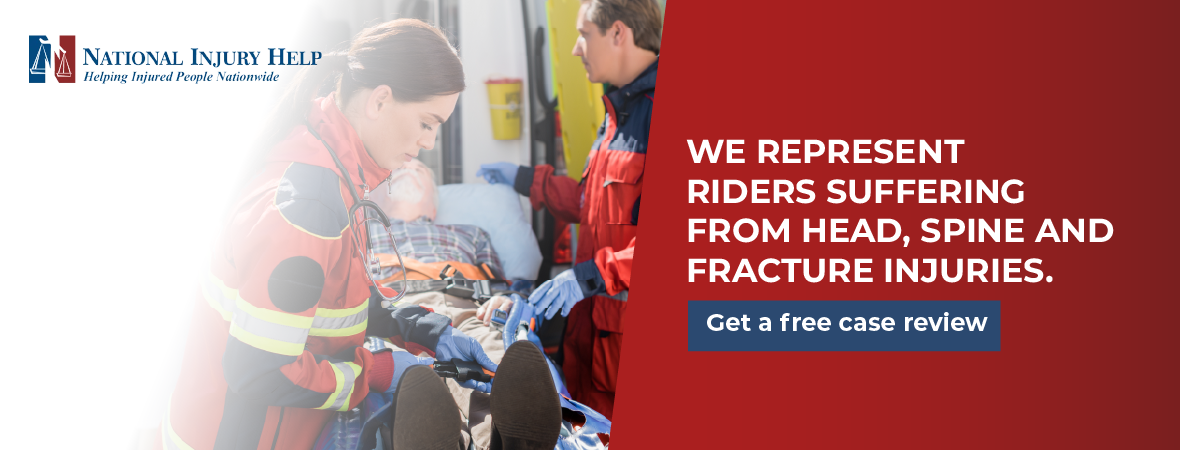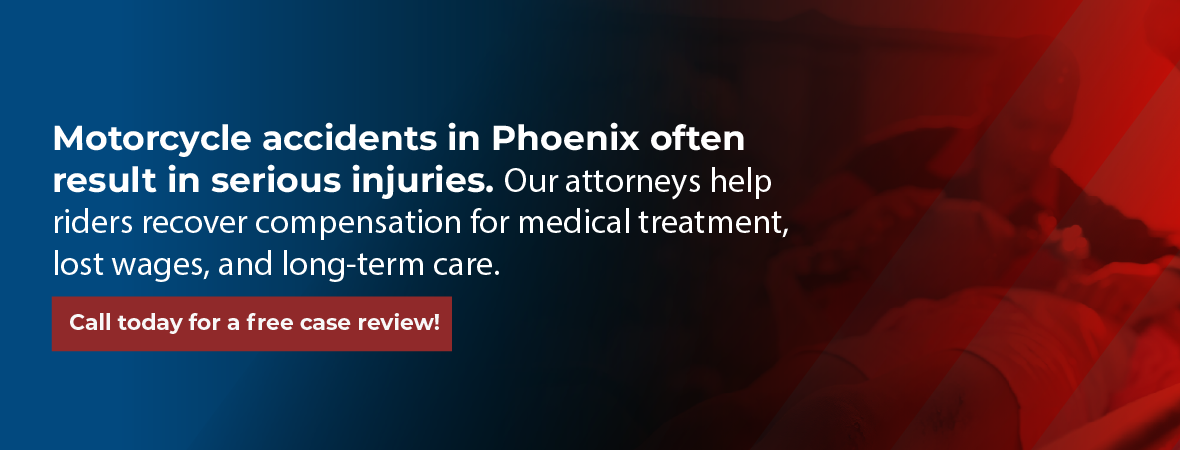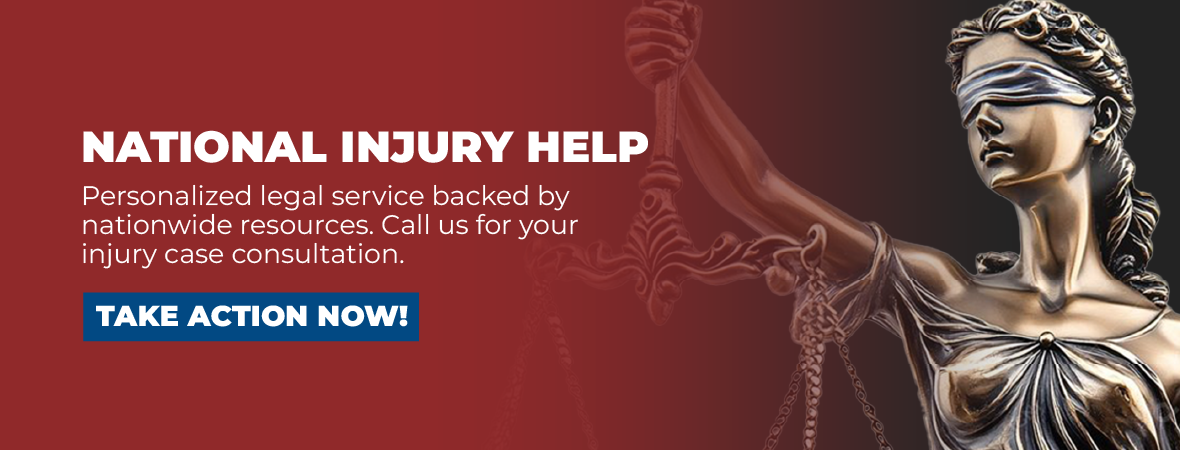After experiencing the pain of an accident, let our National Injury Help team handle the legal battle for you. Focus on your recovery while we fight for justice and pursue the compensation you need. Contact us for a free consultation today.
Riding a motorcycle through the wide, sunlit streets of Phoenix can be thrilling, but it also comes with risks. While cars and trucks provide layers of protection, motorcycle riders have little shielding from the full impact of a crash. Even a relatively minor collision can result in painful, life-altering injuries.
Unfortunately, motorcyclists are often the ones who suffer the most, especially in busy areas like Interstate 10, Grand Avenue, or intersections near Camelback Road.
If you’ve been injured in a motorbike crash in Phoenix, it’s important to understand the types of injuries you may be dealing with, their potential long-term impact, and what steps you can take to protect your rights. A skilled Phoenix motorcycle accident lawyer can help you pursue compensation for your injuries and guide you through the legal process every step of the way.
Why Motorcycle Injuries Tend to Be More Severe
Motorcyclists are exposed to the road in a way drivers of enclosed vehicles are not. Without airbags, seatbelts, or metal barriers, riders often absorb the full force of a collision. In accidents involving high speeds, multi-lane highways like Loop 101, or heavy city traffic in Downtown Phoenix, these injuries can be catastrophic.
Even protective gear, such as helmets, jackets, and gloves, only does so much to prevent damage. As a result, motorcyclists are far more likely to experience:
- Emergency room visits and hospitalizations
- Surgeries and extended recovery times
- Permanent disabilities or chronic pain
- Emotional trauma and PTSD
Understanding the nature of your injuries is the first step toward seeking the compensation you deserve.
Common Motorcycle Crash Injuries in Phoenix
Traumatic Brain Injuries
Head injuries are among the most serious and life-threatening consequences of a motorcycle accident. While Arizona law requires helmets only for riders under 18, helmets remain the best defense against traumatic brain injuries. Still, even with a helmet, a rider can suffer a concussion or more severe brain trauma if their head hits the ground, a vehicle, or another hard surface.
Common symptoms of TBIs include:
- Headaches or dizziness
- Memory loss or confusion
- Slurred speech or loss of coordination
- Emotional and behavioral changes
Severe TBIs can lead to long-term cognitive impairment, personality shifts, and the need for round-the-clock care. These injuries often require extensive medical documentation and expert testimony in a legal case.
Spinal Cord Injuries and Paralysis
When a rider is thrown from their motorcycle, the spine is particularly vulnerable. A hard impact to the neck, back, or lower spine can result in serious damage to the spinal cord. In some cases, this leads to:
- Paraplegia (paralysis of the legs)
- Quadriplegia (paralysis of all four limbs)
- Nerve damage and chronic pain
- Loss of bladder or bowel control
The costs associated with spinal cord injuries are staggering, especially when you factor in long-term rehabilitation, assistive devices, and home modifications. These injuries often prevent victims from returning to work and living independently.
Broken Bones and Fractures
Bone fractures are extremely common in motorcycle accidents and can range from simple breaks to compound or crushed bones. Riders often suffer fractures when they try to brace themselves during a fall, or when they’re struck by a larger vehicle.
Typical fracture sites include:
- Wrists and forearms
- Legs and ankles
- Ribs and collarbones
- Pelvis and hips
Recovery can involve surgery, metal pins or plates, and months of physical therapy. Even after healing, many victims experience lingering pain, stiffness, or limited mobility.
Road Rash and Skin Abrasions
While it might sound minor, road rash can be a serious and painful injury. When a motorcyclist is thrown from their bike and skids along the pavement, layers of skin can be torn away, leaving deep abrasions that are vulnerable to infection. In severe cases, road rash can damage muscle tissue and nerves.
Road rash injuries are typically classified as:
- First-degree: Superficial abrasions resembling a scrape
- Second-degree: Broken skin with risk of infection
- Third-degree: Deep wounds that may require skin grafts
Wearing protective clothing, such as armored jackets, reinforced pants, and gloves, can reduce the severity of road rash, but it cannot eliminate the risk entirely, especially in high-speed crashes.
Internal Injuries
Not all injuries are visible at the scene of the crash. Blunt force trauma to the abdomen, chest, or internal organs can cause internal bleeding, punctured lungs, or damage to organs like the liver or spleen. These injuries may not present symptoms right away but can become fatal if left untreated.
Common signs of internal injuries include:
- Abdominal swelling or tenderness
- Dizziness or fainting
- Shortness of breath
- Blood in urine or stool
After a motorcycle accident, it’s critical to get a full medical evaluation, even if you feel fine. Early detection can save your life and strengthen your injury claim.
Facial Injuries and Disfigurement
Facial trauma is common in crashes where riders are thrown over the handlebars or strike the pavement face-first. Even with a helmet, the lower half of the face may be exposed. These injuries can include:
- Broken jaws or cheekbones
- Dental damage
- Lacerations and scarring
- Eye injuries or vision loss
In some cases, facial reconstruction surgery may be necessary. Scarring and disfigurement can also lead to significant psychological effects, especially for younger victims or those in public-facing professions.
Amputations and Crush Injuries
Some motorcycle crashes result in traumatic amputations or injuries so severe that amputation becomes medically necessary. A rider’s limbs may be crushed between vehicles, trapped under wreckage, or severely damaged by sharp debris. Amputations are life-altering injuries that require:
- Prosthetic limbs and mobility aids
- Extensive rehabilitation
- Career changes and emotional support
- Ongoing pain management
The costs, both financial and emotional, can be overwhelming. An experienced biker injury attorney can help calculate the long-term impact and fight for compensation that reflects the severity of the loss.
Emotional and Psychological Trauma
Physical injuries are only one part of a motorcycle accident’s toll. Many victims experience post-traumatic stress disorder, anxiety, depression, or a fear of riding again. Emotional injuries can interfere with relationships, job performance, and overall quality of life.
Signs of psychological trauma may include:
- Sleep disturbances or nightmares
- Flashbacks of the accident
- Social withdrawal
- Mood swings or irritability
These damages are just as real as physical ones and should be included in any injury claim.
How Injury Severity Impacts Your Motorcycle Accident Claim
The severity of your injuries plays a major role in the outcome of your motorcycle accident claim. While any crash can result in pain, more serious injuries often lead to higher medical bills, longer recovery times, and greater overall losses, both economic and emotional. Insurance companies closely scrutinize the type and extent of your injuries to determine how much they’re willing to pay. That’s why documenting the full scope of your condition is crucial to building a strong case.
Minor injuries, such as sprains or first-degree road rash, may be relatively easy to treat and result in modest compensation. But moderate to severe injuries, like fractured bones, herniated discs, traumatic brain injuries, or paralysis, can quickly escalate a claim’s value. These injuries may require surgery, long-term physical therapy, assistive devices, or even lifelong care.
In addition to medical expenses, the severity of your injury also affects:
- Lost income if you’re unable to work or must switch to a lower-paying job
- Pain and suffering are based on the duration and intensity of your physical and emotional distress
- Future damages such as ongoing treatments, home modifications, or loss of earning capacity
A seasoned Phoenix motorcycle accident lawyer will work with medical professionals, vocational experts, and financial planners to assess your damages accurately. This ensures you don’t settle for less than you truly need to recover and rebuild your life.
The insurance company’s goal is to pay out as little as possible. They may argue your injuries aren’t as serious as claimed or offer a quick, low settlement, hoping you’ll take it before knowing the full extent of your condition.
Don’t let them minimize your suffering. By aligning yourself with a knowledgeable legal advocate, you increase your chances of receiving fair compensation that reflects the real impact of your injuries, both now and in the years ahead.
Talk to a Phoenix Motorcycle Accident Lawyer About Your Injuries
Motorcycle crash injuries can change your life in an instant. Whether you’re dealing with broken bones, a traumatic brain injury, or emotional trauma, you deserve compensation that reflects the true cost of your suffering. Don’t let insurance companies minimize your claim or blame you for an accident you didn’t cause.
At National Injury Help, our experienced Phoenix motorcycle accident lawyers know how to stand up for injured riders. We’ll help you gather medical evidence, consult with specialists, and pursue the full damages you’re entitled to. Call us today at 1 (800) 214-1010 for a free consultation and let us fight for the justice you deserve.








